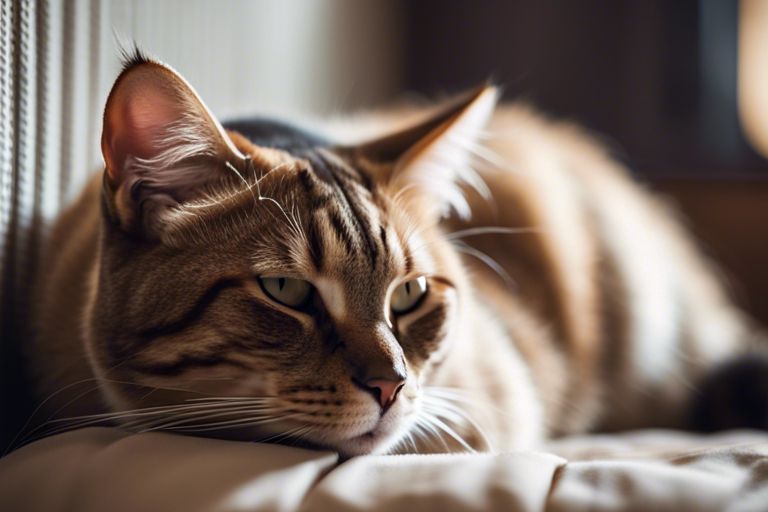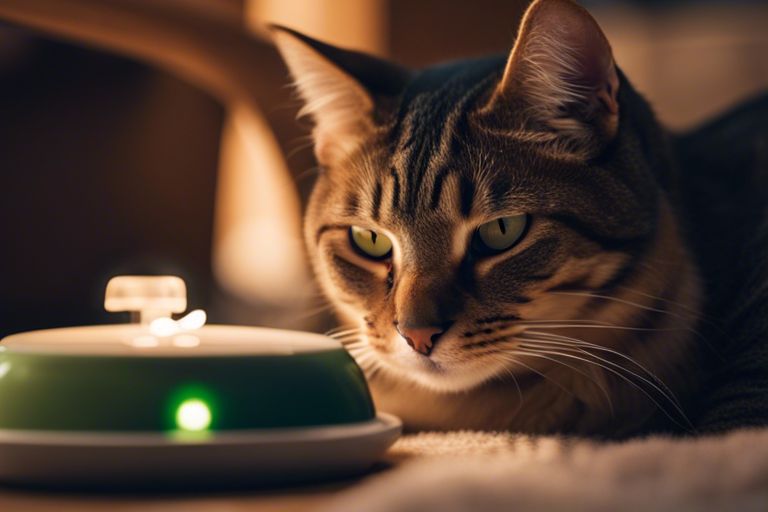Experiencing lethargy in your cat can be concerning, but it’s important to understand that it can be a normal behavior in certain situations. However, it’s crucial to recognize when it could be a sign of a more serious issue. If your cat is unusually lethargic, lacks interest in activities they usually enjoy, or shows other concerning symptoms such as vomiting or diarrhea, it’s important to seek veterinary attention. Additionally, if your cat has been lethargic for an extended period of time, it could be a sign of an underlying medical condition that needs to be addressed. In this blog post, we’ll explore the potential causes of lethargy in cats, as well as when it’s time to be concerned and seek professional help.
Key Takeaways:
- Consult with a veterinarian: If your cat is unusually lethargic, it’s important to seek professional advice from a veterinarian to rule out any underlying health issues.
- Monitor other symptoms: Keep an eye out for additional symptoms such as loss of appetite, vomiting, or changes in litter box habits, as these can help your vet make an accurate diagnosis.
- Changes in behavior: Pay attention to any changes in your cat’s behavior or routine, as these can provide important clues about their overall health and well-being.
- Maintain a healthy lifestyle: Ensure your cat receives regular exercise, a balanced diet, and routine veterinary care to promote overall health and wellness.
- Keep an eye on environmental factors: Factors such as stress, changes in routine, or exposure to toxins can contribute to lethargy in cats, so it’s important to consider these potential influences.
Identifying Lethargy in Cats
Some cats are naturally more laid-back and relaxed than others, but extreme lethargy can be a cause for concern. Lethargy in cats is characterized by a lack of energy, decreased interest in usual activities, and excessive sleeping. It may also be accompanied by other symptoms such as loss of appetite, vomiting, or diarrhea. In order to determine if your cat’s behavior is normal or if it may be a sign of an underlying health issue, you need to be able to identify lethargy in your cat.
Typical Cat Behavior versus Lethargy
It’s important to be able to differentiate between your cat’s typical behavior and true lethargy. While some cats may be more sedentary or less playful than others, you should be concerned if your cat is displaying a significant decrease in activity and is uninterested in things they previously enjoyed. For example, if your cat is not responding to their favorite toy or is not showing any interest in going outside, it may be a sign of lethargy.
Signs and Symptoms to Observe
When determining if your cat is lethargic, you should pay attention to any other accompanying signs and symptoms. This can include changes in appetite, drinking, and litter box habits. If your cat is not eating or drinking normally, has diarrhea or vomiting, or has difficulty breathing, these are all signs that should be taken seriously. In addition, if your cat appears to be in pain, is limping, or is showing any other unusual behavior, it is important to seek veterinary attention immediately.
Common Causes of Lethargy in Cats
One common cause of lethargy in cats is an underlying medical condition. Illnesses such as Lethargy in Cats – Symptoms, Causes, Diagnosis … can cause your cat to feel weak and tired, leading to a lack of energy and interest in their usual activities..
Medical Conditions
If your cat is lethargic, it could be a sign of a more serious medical issue such as kidney disease or diabetes. Additionally, infections, anemia, and certain medications can also cause lethargy in cats. It’s important to take your cat to the vet for a thorough examination if you notice prolonged lethargy.
Environmental and Emotional Factors
Environmental and emotional factors can also lead to lethargy in cats. Stress, depression, and anxiety can manifest in decreased activity levels and can affect your cat’s overall well-being. Other environmental factors such as extreme temperatures, poor air quality, or lack of stimulation can also contribute to your cat feeling sluggish and unenergetic. After ruling out any medical conditions, you should evaluate your cat’s living environment and make any necessary changes to ensure they are comfortable and happy.
- Stress, depression, and anxiety can lead to lethargy in your cat.
- Extreme temperatures and poor air quality can also contribute to your cat feeling sluggish.
- Make sure your cat has plenty of mental and physical stimulation to keep them engaged and active.
When to Seek Veterinary Care
After observing your lethargic cat and assessing their severity and duration of symptoms, it is important to know when it is appropriate to seek veterinary care. While it’s normal for a cat to have lazy days every now and then, if your cat’s lethargy is persisting for more than 24 hours, you should contact your veterinarian. Additionally, if your cat’s lack of energy is accompanied by other concerning symptoms such as loss of appetite, vomiting, diarrhea, or difficulty breathing, it’s crucial to seek professional help immediately.
Assessing Severity and Duration
When assessing the severity and duration of your cat’s lethargy, consider how it compares to their usual behavior. If your typically active cat is now spending most of their time sleeping and showing no interest in play or other activities, this could be a cause for concern. On the other hand, if your senior cat is generally less active due to age, it may not be as alarming. However, any significant change in your cat’s energy level warrants veterinary attention, especially if it lasts for an extended period.
Diagnostic Procedures and Treatments
If you decide to seek veterinary care for your lethargic cat, your veterinarian may perform a thorough physical examination and run various diagnostic tests to determine the underlying cause of your cat’s symptoms. These tests may include blood work, urine analysis, imaging studies, and other specialized tests. Depending on the findings, your veterinarian will recommend an appropriate treatment plan, which may include medication, dietary changes, or supportive care.

Managing and Preventing Lethargy
Unlike humans, cats can’t communicate when something is wrong. It’s up to you to look out for signs of lethargy and take action to manage and prevent it. By creating a safe environment, providing a balanced diet, and keeping up with regular check-ups and vaccinations, you can help keep your cat healthy and active.
Home Care Strategies
When it comes to managing and preventing lethargy in your cat, there are a few home care strategies you can easily implement. Make sure your cat has a comfortable and safe environment to rest and play. Provide plenty of mental and physical stimulation to keep them engaged and active. Additionally, feeding your cat a balanced diet and ensuring they stay hydrated are crucial for maintaining their overall health and vitality. If you notice any changes in your cat’s behavior, appetite, or activity level, it’s important to consult with your veterinarian as soon as possible.
Importance of Regular Check-ups and Vaccinations
Regular check-ups and vaccinations play a crucial role in preventing and managing lethargy in cats. These visits allow your veterinarian to monitor your cat’s overall health, detect any potential issues early on, and provide the necessary vaccinations to protect against common diseases. By keeping up with your cat’s veterinary care, you can ensure they receive the necessary preventive healthcare and identify and address any underlying health concerns before they become serious.
Is it normal for my cat to be lethargic?
Now that you have read about the common causes of lethargy in cats, it is important to remember that while a certain amount of sleepiness or inactivity is normal, prolonged or severe lethargy could be a sign of a more serious underlying issue. If you notice that your cat is unusually tired for an extended period of time, it is best to consult with your veterinarian to rule out any potential health problems. By being attentive to your cat’s behavior and seeking professional guidance, you can ensure that your furry friend stays happy and healthy.
FAQ
Q: Is it normal for my cat to be lethargic?
A: Although some cats may appear lethargic from time to time, it is not typical for a cat to be consistently lethargic. Lethargy can be a sign of an underlying health issue and should be addressed by a veterinarian as soon as possible.
Q: What are some potential causes of lethargy in cats?
A: Lethargy in cats can be caused by a variety of factors, including but not limited to: illness, pain, stress, obesity, nutritional deficiencies, and age-related issues. It is important to have your cat examined by a veterinarian to determine the specific cause of their lethargy.
Q: How can I help my lethargic cat?
A: If you notice your cat is lethargic, it is important to seek veterinary care. In the meantime, ensure your cat has access to fresh water, a comfortable resting place, and a quiet environment. Avoid forcing your cat to be active and encourage them to rest until they can be evaluated by a veterinarian.

Jayley, a devoted cat enthusiast, also writer for other cat blog as well. She aims to dedicated to providing comprehensive information, insights, and advice on everything you’d ever want to know about our whiskered companions.
